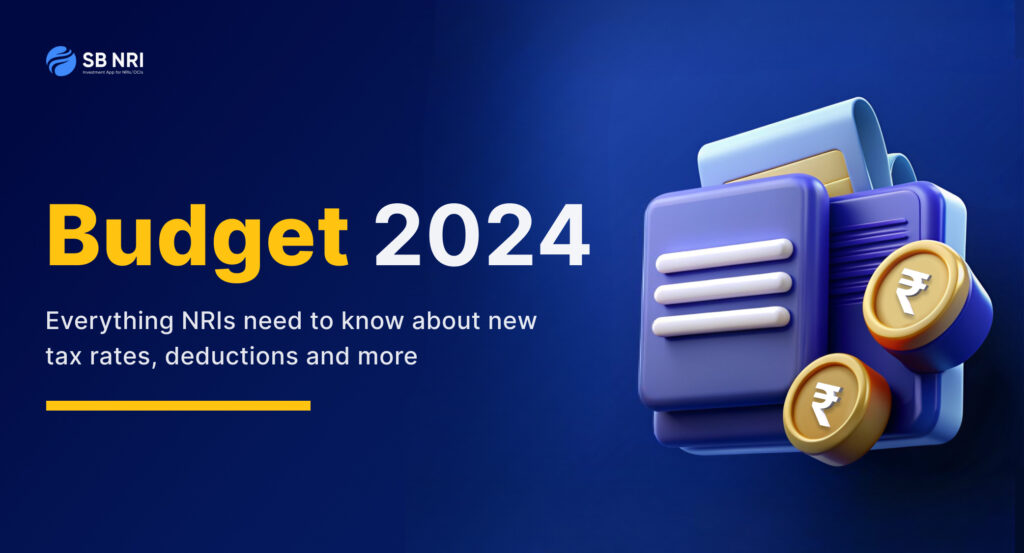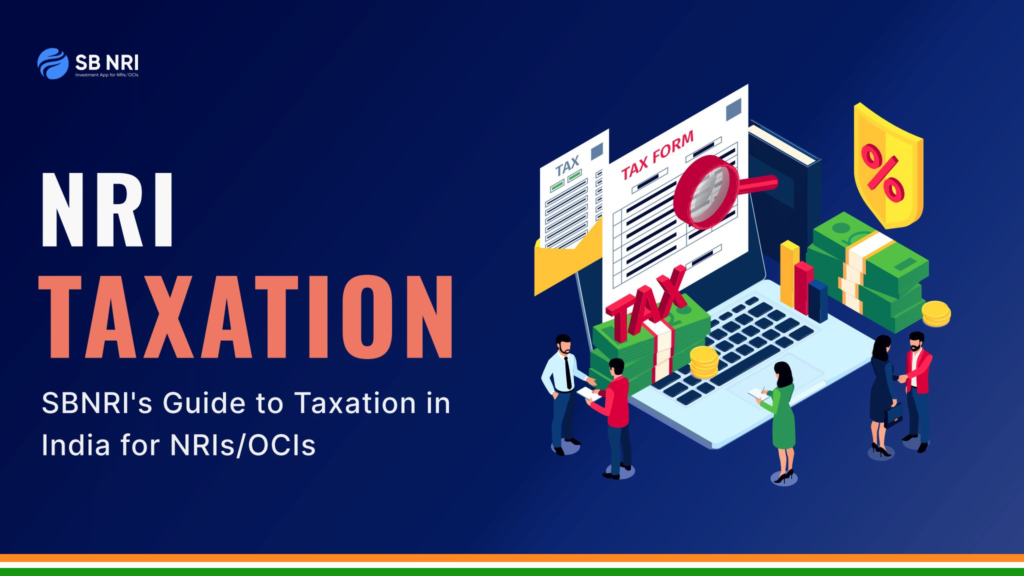
The Union Budget 2024, presented by Finance Minister Nirmala Sitharaman, brings several changes that will significantly impact the financial landscape for Non-Resident Indian(NRI) and Overseas Citizen of India(OCI). This blog will summarize the key highlights of Budget 2024 for NRIs/OCIs ensuring you’re well-informed about the latest fiscal policies, from revised tax rates to new deductions and exemptions.
Revised Income Tax Slabs for FY 2024-25
The new income tax slabs for the financial year 2024-25 have been designed to offer more relief to taxpayers, especially those in the middle-income group. FM Nirmala Sitharaman has announced changes in the tax slabs for the new regime. The changes will be applicable for the FY24-25 and will be used to compute Income Tax when filing it next year. The new revised slab rates are:
| Income Tax Slab | New Regime Slab Rates for FY 24-25 (AY 25-26) |
| Up to Rs. 3 lakh | Nil |
| Rs. 3,00,000 -Rs. 7,00,000 | 5% (Rebate u/s 87A available) |
| Rs. 7,00,001 lakh to Rs. 10,00,000 | 10% |
| Rs. 10,00,001 to Rs. 12,00,000 | 15% |
| Rs. 12,00,001 to Rs. 15,00,000 | 20% |
| Above Rs 15,00,000 | 30% |
These revised slabs are part of the new tax regime and will be applicable for the assessment year 2025-26. It is also to note that there have been no changes in the old regime and the slab rates for the old regime will continue. It is also to note that Rebate under Sec 87A will not be applicable for NRIs/OCIs as only residents can avail it.
Key Takeaway of Budget 2024 for NRIs/OCIs: NRIs/OCIs opting for the new regime in the tax filing for FY 24-25 when the tax filing season opens next year, will benefit from this change in slab rates. Previously an NRI/OCI with an income of Rs 10 lakhs for an FY in India would have to pay Rs 60,000 as per old rates, now they will only have to pay Rs 50,000 for an income of Rs 10 lakhs after rate revision.
Also read: NRI Income Tax Slab Rates for FY 2023-24 (AY 2024-25)
Standard Deduction Increased to Rs 75,000
To further ease the tax burden, the standard deduction under the new regime has been increased from Rs. 50,000 to Rs. 75,000. This adjustment ensures that individuals with an income up to Rs. 7.75 lakhs will not have to pay any tax after accounting for the Section 87A rebate and the standard deduction.
Key Takeaway of Budget 2024 for NRIs/OCIs: It is to be noted that Standard deduction can only be availed by salaried employees and won’t be applicable for NRIs/OCIs.
Also read: Budget 2024 Highlights: Key Takeaways & Sectors to Watch Post-Budget
Increased Long-Term Capital Gains (LTCG) Limit after Budget 2024
One of the most notable changes is the increase in the Long-Term Capital Gains (LTCG) exemption limit for listed equity shares and units of equity-oriented mutual funds. Previously set at Rs 1 lakh, the new limit has been raised to Rs 1.25 lakh. This change provides a higher threshold for long-term capital gains, allowing investors to benefit from a larger exemption before any tax is levied. This adjustment is expected to ease the tax burden on long-term investors and encourage long-term investment in equities and other assets.
Key Takeaway of Budget 2024 for NRIs/OCIs: NRIs/OCIs investing in Indian markets now can avail exemption from LTCG up to Rs 1.25 lakh which was previously limited to Rs 1 lakh. Now NRIs/OCIs won’t have to pay taxes for LTCG realized for a year up to Rs 1.25 lakh as per new rules.
Also read: Penalty for Non-filing of ITR by Due Date: Know all the Rules

Revised LTCG Tax Rate after Budget 2024
Along with the increase in the exemption limit, the LTCG tax rate has also seen a revision. The rate has been updated from 10% to 12.5%. This change means that any capital gains exceeding the new exemption limit of Rs 1.25 lakh will be taxed at 12.5%. This adjustment aligns with the government’s aim to balance taxation while encouraging long-term investments in the financial markets.
Key Takeaway of Budget 2024 for NRIs/OCIs: This change will mean higher tax rates for NRIs/OCIs if their LTCG limit is above the threshold of Rs 1.25 lakhs. But do note that the 12.5% tax rate will only apply to LTCG above Rs 1.25 lakhs.
Also read: New Rules for NRI Taxation in India FY-2023-24
Changes to Capital Gains Tax for Property and Real Estate
The government has removed the indexation benefit from LTCG effective from the Budget 2024. The long-term capital gains (LTCG) tax on real estate was previously 20% with indexation benefits. While the LTCG rate has been reduced to 12.5%, the indexation benefits have been removed. The removal of indexation will likely increase the taxation liability for homeowners looking to sell their property as their realized capital gain will be much higher due to the absence of indexation benefits.
Key Takeaway of Budget 2024 for NRIs/OCIs: The removal of the indexation benefit will increase the taxation liability for NRIs/OCIs looking to sell their real estate property in India. The absence of indexation benefits will increase the capital gain in the hands of the seller. However, NRIs/OCIs can invest in various capital gain exemption bonds, and other assets to claim capital gain benefits.

Increased Short-Term Capital Gains (STCG) Rate after Budget 2024
Basis Budget 2024 announcement, Short-term capital gains tax on specific financial assets, such as listed equity shares and units of equity-oriented mutual funds, will increase from 15% to 20%, while other non-financial assets will continue to be taxed at the applicable rates.
Key Takeaway of Budget 2024 for NRIs/OCIs: The increase in STCG will increase the taxation in the hands of the NRI/OCI investor. However, they can invest for a long time and look to benefit from the increased LTCG limit of Rs 1.25 lakhs.
Also Read: 5 Ways to save on the tax NRIs have to pay
When do Budget Tax changes take effect?
To ensure uniformity in the holding period of capital assets, the Finance Minister proposed that all listed financial assets will be classified as long-term if held for more than one year, while unlisted financial assets and non-financial assets will be considered long-term if held for more than two years. Additionally, the indexation benefit for calculating long-term capital gains on all long-term capital assets, including immovable properties, will be removed. Unlisted bonds and debentures will still attract capital gains tax at the applicable slab rates regardless of the holding period. These changes regarding indexation, holding periods, and capital gains tax rates will take effect from July 23, 2024.
Wrapping Up
The Budget 2024 introduces several measures that could have a profound impact on NRIs, ranging from changes in tax rates and capital gains to significant investments in infrastructure and housing. These reforms aim to simplify tax compliance, boost investment opportunities, and enhance the overall economic environment in India. NRIs should stay updated with these changes to optimize their financial planning and take advantage of new opportunities emerging in India’s dynamic market.
Access SBNRI’s Exclusive NRI Taxation Guide

NRIs and OCIs can now access SBNRI’s exclusive NRI Taxation Guide covering in-depth information about DTAA, Gift Tax, Rental Income Tax, ITR Filing, Types of ITR Forms for NRIs, Capital Gain Tax, Income Tax, and more. The report will help you understand India taxation on mutual funds, other asset classes and how you can comply with the regulations.
Access NRI Taxation Guide here
Calculate your TDS Refund with SBNRI’s TDS Refund Calculator
A TDS refund is the process of reclaiming the excess tax deducted at source by the payer if the actual tax liability of the taxpayer is lower than the TDS deducted. This situation typically arises when the income tax calculated on the total income is less than the TDS already deducted. To claim a TDS refund, taxpayers need to file an income tax return (ITR). The Income Tax Department processes the ITR and verifies the details. If the tax department finds that the TDS paid is more than the actual tax liability, the excess amount is refunded to the taxpayer.
You can easily find out how much tax refund you can get by calculating your TDS Refund from this TDS Refund Calculator.
Looking for NRI ITR Filing? Connect with SBNRI NRI Tax Expert CA Today!

At SBNRI, we have simplified ITR filing for NRIs/OCIs through a smooth digital journey. Be it Basic Filing, Advanced Filing (includes Capital Gain, etc.), or Premium Filing (Foreign Income), we can help you assess the right computation and lower your tax liability.
“We’ve helped over 500+ NRIs/OCIs file ITR returns and more than 25,000+ across other taxation services last financial year and we’d love to help you out too”
You can download SBNRI App or connect with NRI Tax Expert team directly via the button below.
FAQs
What is the new Long Term Capital Gains (LTCG) tax rate?
The LTCG tax rate has been revised to 12.5%, and the LTCG limit has been increased to Rs 1.25 lakh per year from Rs 1 lakh.
Is Angel Tax still applicable?
No, Angel Tax has been abolished across all categories of taxpayers.
What are the new capital gains tax rates introduced in Budget 2024?
The long-term capital gains (LTCG) tax rate has been increased from 10% to 12.5%, and the exemption limit for LTCG has been raised from Rs 1 lakh to Rs 1.25 lakh per year.
Who will be most affected by the changes in capital gains tax?
Individuals earning more than Rs 1.25 lakh per year in long-term capital gains will be most affected by the new tax rate, as they will now pay a higher rate of 12.5% compared to the previous 10%.
What changes were made to the standard deduction under the new regime?
The standard deduction under the new tax regime has been increased from Rs 50,000 to Rs 75,000, providing more relief to taxpayers.
Are there any changes to the tax slabs in Budget 2024?
Yes, the revised tax slabs under the new regime are: 0-3 lakhs (Nil), 3-7 lakhs (5%), 7-10 lakhs (10%), 10-12 lakhs (15%), 12-15 lakhs (20%), and above 15 lakhs (30%).
Has the Angel Tax been affected by Budget 2024?
The Angel Tax has been abolished across all categories of taxpayers, which is expected to benefit startups and investors.
What are the new TDS rules for mutual fund withdrawals?
The 20% TDS on mutual fund (MF) withdrawals has been removed, which will ease the liquidity for investors in mutual funds.
When do the new capital gains tax changes take effect?
The new changes to capital gains tax will take effect from April 1, 2024.
How will the new capital gains tax affect small investors?
Small investors with annual long-term capital gains up to Rs 1.25 lakh will not be affected by the new tax rate, as they will still be within the exempted limit.
What is the impact of the new capital gains tax on high-income earners?
High-income earners with substantial long-term capital gains will face higher tax liabilities due to the increased LTCG tax rate of 12.5%.
How do the changes in capital gains tax align with the government’s fiscal policies?
The changes in capital gains tax are part of the government’s efforts to increase tax revenues and support fiscal consolidation while providing targeted benefits to middle-income taxpayers and startups.



